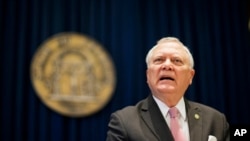The governor of the U.S. state of Georgia has vetoed legislation that would have allowed faith-based groups to use their religious beliefs to deny services to gays, acceding to the demands of major corporations that he reject the bill as discriminatory.
Governor Nathan Deal, a Republican, said he vetoed the measure Monday because he did "not think that we have to discriminate against anyone to protect the faith-based community in Georgia."
Conservative Christian groups in the southern state called for passage of the "religious liberty" bill to protect clergy who refused to perform gay marriages, and churches and affiliated groups from serving or hiring someone if it violated their "sincerely held religious belief."
But major U.S. corporations, including the Disney entertainment conglomerate, technology giants Apple and Intel, the Time Warner news media company and sports leagues called for Deal to veto the legislation, which had easily passed the Georgia state legislature.
The companies said it would excuse discrimination and many threatened to boycott the state if the law took effect.
Deal said his decision to veto the bill was "about the character of our state and the character of our people. Georgia is a welcoming state; it is full of loving, kind and generous people."
Disputes like the one in Georgia have cropped up in numerous U.S. states in the aftermath of last year's Supreme Court decision legalizing same-sex marriage.
Religious conservatives opposed to the high court's ruling have in turn sought, with little success, to win approval for state laws that seek to protect those opposed to providing various services to gays and transgender people, cultural and business decisions they say are based on their religious beliefs.










